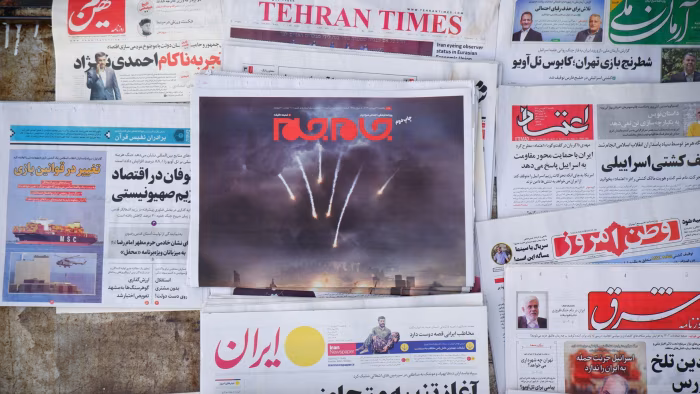
US stocks slid and equity-market volatility hit a six-month peak following Iran’s military strike on Israel, as markets assessed the risk of the conflict escalating into a full-blown war that could curb energy supplies from the region.
Traders had been anxiously watching to see how markets would react after the Islamic republic on Saturday launched its first strike on Israel from its own territory. Tehran sent drones and missiles towards the Jewish state in retaliation for a suspected Israeli attack on its consulate in Damascus on April 1 that killed several military commanders.
Wall Street’s benchmark S&P 500 index reversed an early gain of 0.8 per cent to close down 1.2 per cent as investors fretted over the impact of higher tensions in the oil-rich region.
“[Equity] markets are worrying about Israel’s response” to Iran’s missile bombardment over the weekend, said Mike Zigmont, head of trading at Harvest Volatility Management.
The Vix index, a measure of volatility known as Wall Street’s fear gauge, rose to its highest since late October, when the current six-month rally in stocks began.
Big tech stocks, including Microsoft, Apple and Alphabet, were among the biggest fallers on Monday, down 2 per cent, 2.1 per cent and 1.8 per cent respectively.
Oil prices swung through the day with Brent crude, the international oil benchmark, down almost 1.5 per cent earlier, but recovering to stand 0.1 per cent lower later in the US day at $90.33 per barrel. West Texas Intermediate, the US marker, rallied from similar weakness to end flat at $85.64 per barrel.
Daniel Hynes, senior commodity strategist at ANZ Bank, said the fact that the attacks were well telegraphed had eased oil market concerns. “We had a build-up in the oil price before the weekend and so a geopolitical price premium was already built in prior to this event.”
The price swings suggest investors were unsure about how to read the weekend’s event, veering between worries about the potential for a broad flight to safety and concerns about any possible effect on inflation.
“If the world were really scared, Treasury yields would be lower [and] they’re not,” said Harvest’s Zigmont.
Treasury yields rose steadily to hit five-month highs, suggesting inflationary worries were the top consideration for bondholders.
Earlier, US retail sales figures for March came in stronger than anticipated, compounding fears that the world’s biggest economy is still running too hot to merit interest rate cuts.
Yields on benchmark 10-year Treasuries, which move inversely to prices, peaked at 4.66 per cent following the data, up 0.16 percentage points.
The price of gold, a haven asset, rose 1.7 per cent to $2,382 a troy ounce, setting a new record.
Allies including US President Joe Biden have urged Israel to take a measured approach in its response. Prime Minister Benjamin Netanyahu’s war cabinet met on Sunday and Monday but has not said how the country will react. However, chief of the Israel Defense Forces Herzi Halevi said after the Monday meeting that: “this launch . . . will be met with a response”.
Experts warned that a severe response from Israel could exacerbate the conflict, restricting oil supplies from the region and pushing up prices.
“A significant Israeli retaliation could trigger a destabilising retaliatory cycle and move this conflict up the escalation ladder,” said Helima Croft, head of global commodity strategy at RBC Capital Markets and a former CIA analyst. “In such a scenario, we think the risk to oil is not insignificant.”
Oil prices had climbed to their highest level since October in recent weeks following the attack on Damascus as markets weighed the potential for an escalation of the conflict that could affect Gulf supplies.
Bob McNally, president of consultancy Rapidan Energy and a former energy adviser to US president George W Bush, said the fallout from the Iranian strike could still propel prices “towards, if not beyond, $100 per barrel”.
“The market had been complacent about the Gaza conflict expanding to include Iran and, therefore, a material risk to Arabian Gulf oil and [liquefied natural gas] production and exports,” he said.
A worsening of the conflict risks shocking a tight oil market globally as demand escalates in big economies such as the US and China while Opec+ producers constrain supply.
“The US and China stand to lose from the conflict’s expansion as it would significantly impact energy exports from the region, the price of oil, and the global economy,” said Ayham Kamel, practice head for the Middle East and north Africa region at consultancy Eurasia Group.
In Europe, the region-wide Stoxx 600 share index closed 0.1 per cent higher, buoyed by strong performance for industrial and consumer groups, while London’s energy-heavy FTSE 100 fell 0.5 per cent.


